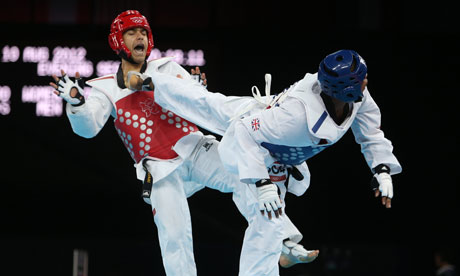
Introduction
The other one that isn't karate (seriously, why isn't karate in the Olympics?). If all the martial arts were elements of a night out in Warrington, taekwondo constitutes the coked-up pre-club street scuffle to judo's drunken barside reconciliation. Where the latter fusses tearfully, grappling with emotional truths, the former delivers a preposterous bravura kick to the temple and moves on.
As a pursuit, it seems mainly to involve getting incredibly hard; I once went to a taster session and they made us do fist pressups for an hour. If you're looking for a gruelling all-round workout, along with the ability to silence dissent with a twitch of your quadriceps, this could be the sport for you.
The basics
Taekwondo, which translates as "the way of breaking things with the hand or foot", originated in Korea and consists of a system of punches, kicks and blocks, sometimes with sweeps and throws. A training session often involves doing all of them in formation with other class members, like the world's most belligerent flashmob, or like one Thriller tribute group defending its territory against another. While the punches are fearsome, kicks are favoured in higher-level competition because of their greater range and power. Emphasis is also placed in training on etiquette, respect and mindfulness.
Health benefits
A truly punishing discipline. Taekwondo builds strength, stamina, flexibility and focus.
Equipment, costs and practicalities
Students wear a dobok – jacket and trousers – tied at the waist, in white or black. As with other martial arts, the darker the belt the better. A white beginner's set can be yours for around £30.
Taekwondo is one of those sports you'll find difficult to undertake without a club. Luckily, there are loads. This handy tool on the British Taekwondo site should help you find your nearest.
Trendiness rating: 9/10
There's a lot to be said for the sheer brutality of a spinning headkick in a world of health and safety gone mad. Though not by you. You'll be too busy looking for your teeth to say anything.
Inside line
Adrian Tranter, president of British Taekwondo: "I would encourage anyone to practise taekwondo. Of course we are an Olympic sport, and if that's the level you want to aspire to, then get involved at one of our clubs by visiting britishtaekwondo.org.
You may wish to practise a martial art for a variety of other reasons – to become more self-reliant, develop higher self-esteem, be more confident, get healthy, learn how to defend yourself, become more flexible or generally just be involved in an enthusiastic club environment.
Anyone can do taekwondo, from five years to 75 years – there are no barriers whatsoever. All our coaches and instructors are CRB-checked and fully insured, so you are in safe hands. So get involved – it's a great sport; we have a vibrant club network, and our coaches and instructors will welcome you through their doors."
Find out more
britishtaekwondo.org.uk/ – British Taekwondo.
wtf.org/ – World Taekwondo Federation, the international governing body.
You may also like
Judo, WKDs.
You might hate
Synchronised swimming, horse riding.
Over to you
Are you into taekwondo? Help us build up this resource by sharing tips, videos, links to clubs and anything else that beginners might find useful.

